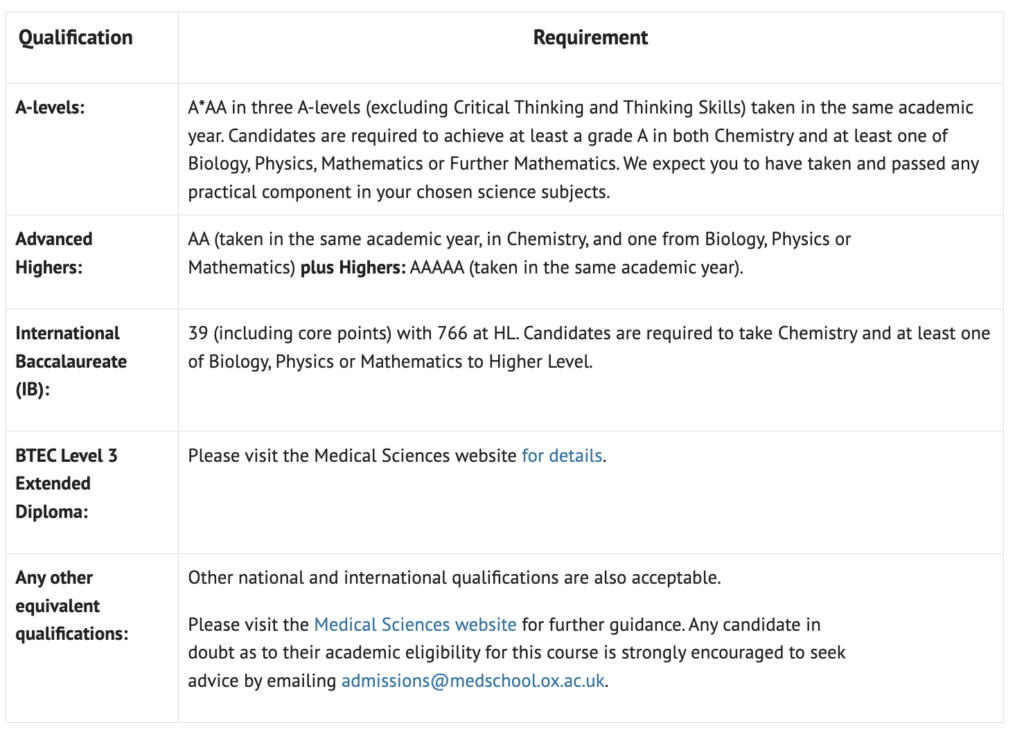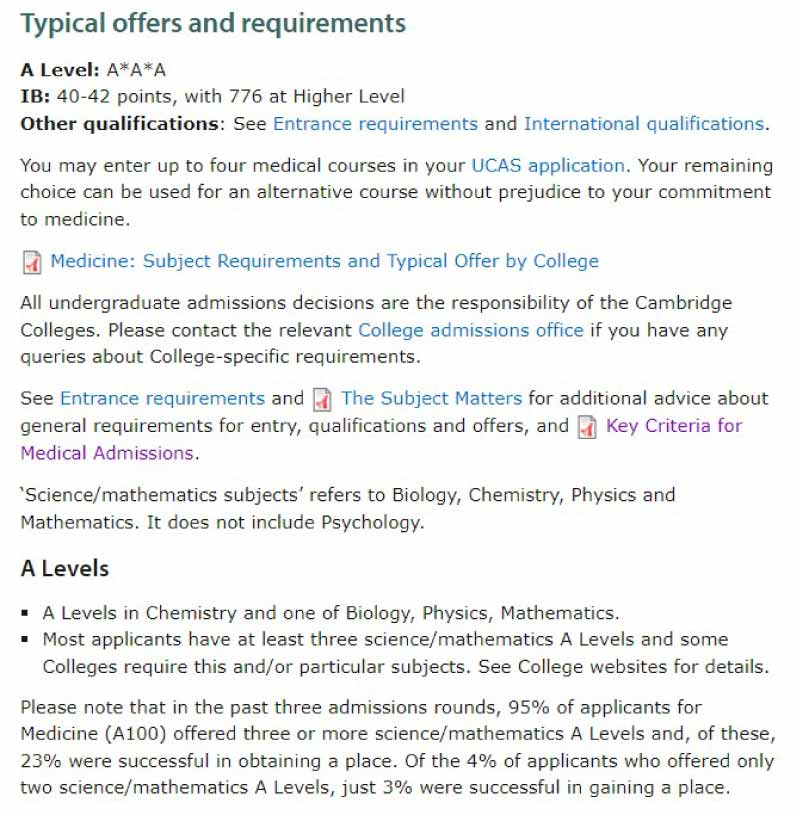What A-levels do I need to reach my goal of becoming a doctor?
It might be a daunting prospect having to choose subjects that could guide your future career. Fortunately, most medical schools have clear information on what they require.
To help make the process less daunting, we have gone through how many A-level subjects you should take, which subjects you should choose, and what Cambridge and Oxford say they prefer for students applying to Medicine.
How Many A-level Subjects Do You Need For Medicine?
Choosing the number of A-level subjects to take is a balance between meeting the Medicine A-level entry requirements and achieving high grades to compete with your fellow applicants.
Students take at least three A-levels (not including resits), and most medical school offers will be a minimum of AAA. Taking four A-levels may be a way to demonstrate your academic ability, but don’t take on more than three if the extra A-level will impinge on how well you can perform. Ultimately, your grades are far more important than taking more A-levels than is necessary.
Ready to start your application
process?
Applying to Oxbridge is notoriously competitive. For some degrees, as few as 6% of all applicants receive an offer. Our Premium Programmes are tailored to triple your chances of gaining an offer from your dream College.
Elliot shares his experiences of working with us and how we helped him to achieve Oxbridge Medicine success.

What do Oxford and Cambridge say about how many A-levels you should take?
Oxford and Cambridge state that there is no requirement to offer more than three A-levels, and it is recognised that not all schools are able to accommodate students taking four A-levels. They go on to suggest that excelling in three relevant to the degree you are applying to is almost always preferable to performing well, but not as highly in more than three A-levels.
Let’s look at how many A-level subjects students apply with, using the A-level admissions statistics for Oxford Medicine applicants. The data comes from a Freedom of Information Request on the 2019 UCAS Cycle.
Oxford Medicine A-level Admissions Statistics
- Number of applicants with 3 or more A-levels: 1128
- Number of students with at least 3 As: 1108 (98%)
- Number of students with 3 or more A*s: 524 (46%)
- Number of students with 4 or more A-levels: 361 (32%)
- Number of students with 4 or more A*s: 156 (14%)
- Number of students with 5 A-levels: 17 (1.5%)
- Number of students with 5 A*s: 10 (0.9%)
It is important to remember that the average success rate for Oxford Medicine is 9%. As only 9% of Oxford applicants are successful, this means that not all students who applied with 4 or more A*s gained a place, showing how competitive it is to get into Oxford Medicine.
Fortunately, your A-levels are just one part of your entire application, so although it will help, you don’t need to apply to Oxford or Cambridge with 5 A*s to secure a place. Going back to what Oxbridge say about the number of A-levels needed, although they say 3, you can see from the Medicine applicants that applying with 4 will help you compete with the cohort.
Of course, you should still always prioritise achieving higher grades over taking more than 3 A-levels.
Want to study Medicine at Oxbridge? UniAdmissions will triple your chances of gaining your offer.
Welcome to UniAdmissions, the world’s first Oxbridge preparatory school with an Oxbridge success rate of 59% and with over 500+ UniAdmissions students placed at Oxford and Cambridge.
Performing well in all areas of the application process is crucial for your success, including the Personal Statement, UCAT and Interviews. Our Medicine Premium Programme prepares you to score highly through one-to-one tuition sessions, intensive courses, and more.
Book a free consultation session or discover our programmes today to learn how you can enrol and triple your chances of success.
What A-levels Are Needed For Medicine?
There is a variety of subjects you can take for your A-Levels, but only a few are really going to help you get your medicine offer, so you need to choose carefully.
Taking A-level Chemistry is a must for Medicine. You may be surprised that it is not Biology that is required by all medical schools as some will only require Chemistry. However, most medical schools will state that your second A-level should be either Biology, Physics or Maths.
Not taking Biology will have a negative impact on your learning at the start of your Medicine degree, and you are likely to be quizzed on Biology-related questions during your Interview. Since medicine and Biology are so intrinsically linked, you will likely already have an interest in the subject if you wish to study medicine at university. So studying Biology at A-Levels will be a fairly obvious choice to make.


- A*AA and A-levels in Chemistry, and one of Biology, Physics Mathematics and Further Mathematics.
- However, most applicants take at least three sciences/maths.
- It is also recommended to check college course pages too just in case they ask for different A-levels.
For applicants applying to Medicine, Oxford ask for:
- A*AA and A-levels in Chemistry, and one of Biology, Physics Mathematics and Further Mathematics.
- However, most applicants take at least three sciences/maths.
- It is also recommended to check college course pages too just in case they ask for different A-levels.


- A*A*A and A-levels in Chemistry, and one of Biology, Physics and Mathematics.
- Like Oxford, most applicants take at least three sciences/maths.
- It is also recommended to check college course pages too just in case they ask for different A-levels.
For applicants applying to Medicine, Cambridge ask for:
- A*A*A and A-levels in Chemistry, and one of Biology, Physics and Mathematics.
- However, most applicants take at least three sciences/maths.
- It is also recommended to check college course pages too just in case they ask for different A-levels.
Cambridge mention that 95% of applicants for Medicine offered three or more science/mathematics A-levels and, of these, 23% were successful in obtaining a place. Of the 4% of applicants who offered only two science/mathematics A-levels, just 3% were successful in gaining a place.
Which A-Level subjects are not needed for Medicine?
Critical Thinking and General Studies are two A-levels that may not be considered full A-levels by medical schools, although they may be helpful additions to your A-level study if compulsory at your school. BTECs may not be looked on as full A-level subjects by some medical schools too.
Do You Need Maths for Medicine?
Mathematics is always a useful subject to study and is almost always accepted as an additional A-Level alongside the three sciences. However, it is rarely a requirement for medical schools, so if you aren’t interested in studying it over a different subject that is relevant to medicine, you shouldn’t have any trouble being eligible for offers.
Access "The Oxbridge Application Vault"
- 300+ page ebook for Oxbridge Applicants
- 25 page ebook for Personal Statement
- 2h+ online course to succeed in any exam
- Online Oxbridge Success Calculator
- 12 page ebook about UniAdmissions

Access "The Big Book Of Oxbridge Applications" For FREE
If you’re applying for Medicine at Oxford or Cambridge, you can discover everything you need to know in The Big Book Of Oxbridge Applications, available for free here! Through over 350 pages, you will find:
- 28 example Oxbridge Personal Statements
- Over 40 admissions test practice questions
- Interviews with Oxbridge students and graduates
- Additional downloadable resources
Fill in your details below to claim your digital copy today!

UK Medical School A-Level Requirements (A - Z)
Below are the current A-Level grade requirements for every medical school in the UK, including subject requirements and available contextual/alternate offers.
| Medical School | A-Level Grade Requirements | A-Level Subject Requirements | Contextual/Alternate Offer? |
|---|---|---|---|
| University of Aberdeen | AAA | Chemistry, plus one of Biology, Physics or Mathematics and 1 other subject | NA |
| Anglia Ruskin University | AAA | Chemistry or Biology, plus one of Chemistry, Biology, Physics or Mathematics and 1 other subject | NA |
| Aston University | A*AA | Chemistry and Biology (A* in one), plus 1 other subject | AAB (A in Chemistry and Biology) |
| Bangor University | AAA | Biology and one of Chemistry, Physics, Mathematics, Further Mathematics, Statistics or Economics and 1 other subject | AAB |
| University of Birmingham | A*AA | Biology and Chemistry | 1 – 2 grades lower |
| Brighton & Sussex Medical School | AAA | Biology and Chemistry | NA |
| University of Bristol | AAA | Chemistry and one of Biology, Physics, Mathematics or Further Mathematics | AAB (A in Chemistry and B in Biology, Physics or Mathematics) |
| Brunel University London | AAB | A in Chemistry or Biology A in one of Chemistry, Biology, Physics or Mathematics | NA |
| University of Cambridge | A*A*A | Chemistry and two of Biology, Human Biology, Physics, Mathematics or Further Mathematics | NA |
| Cardiff University | AAA | Chemistry and Biology | NA |
| University of Dundee | AAA | Chemistry, plus one of Biology, Physics or Mathematics and 1 other subject | ABB |
| Edge Hill University | AAA | Chemistry and Biology plus 1 other subject | If A* is achieved in Chemistry or Biology, the third subject can be a B (e.g. A*AB) |
| University of Edinburgh | A*AA | A* in Chemistry, plus one of Biology, Human Biology, Physics, Mathematics or Further Mathematics | AAA |
| University of Exeter | AAA | Chemistry and Biology | AAC (A in Chemistry and Biology) |
| University of Glasgow | AAA | Chemistry, plus one of Biology, Physics or Mathematics | NA |
| Hull York Medical School | AAA | Chemistry and Biology plus 1 other subject | AAB (A in Chemistry and Biology) |
| Imperial College London | AAA – A*AA | Chemistry and Biology plus 1 other subject | NA |
| Keele University | A*AA | Chemistry or Biology, plus one of Chemistry, Biology, Physics or Mathematics, Further Mathematics, Statistics, Economics or Psychology and 1 other subject | AAA + EPQ |
| Kent & Medway Medical School | AAB | Chemistry or Biology, plus one of Chemistry, Biology, Physics, Mathematics, Psychology or Computer Science and 1 other subject | NA |
| King’s College London | A*AA | Chemistry and Biology | NA |
| Lancaster University | AAA | Any 2 of Chemistry, Biology and Psychology | AABB or AAB + EPQ |
| University of Leeds | AAA | Chemistry and Biology | ABB (Chemistry and Biology with an A in either) |
| University of Leicester | A*AA | Chemistry or Biology, plus one of Chemistry, Biology, Physics, Mathematics or Psychology and 1 other subject | AAAB or AAB – AAA |
| University of LiverpoolUniversity of Liverpool | AAA | Chemistry, plus one of Biology, Physics or Mathematics and 1 other subject | If A* is achieved in Chemistry and A achieved in science or maths, the third subject can be a B (e.g. A*AB) |
| University of Lincoln | AAA | Chemistry and Biology | AAB |
| University of Manchester | AAA | Chemistry or Biology, plus one of Chemistry, Biology, Human Biology, Physics, Mathematics, Further Mathematics or Psychology and 1 other subject | NA |
| Newcastle University | AAA | NA | BBB |
| University of Nottingham | AAA | Chemistry and Biology | AAB (A in Chemistry or Biology) |
| Norwich Medical School (University of East Anglia) | AAA | Chemistry or Biology | NA |
| University of Oxford | A*AA | Chemistry, plus one of Biology, Physics, Mathematics or Further Mathematics and 1 other subject | NA |
| University of Plymouth | A*AA | Biology and one of Chemistry, Physics, Mathematics or Psychology and 1 other subject | AAB (A in Biology and one of Chemistry, Physics, Mathematics or Psychology) |
| Queen Mary University of London | A*AA | Chemistry or Biology and one of Chemistry, Biology, Physics, or Mathematics and 1 other subject | NA |
| Queen’s University Belfast | A*AA | Chemistry and either Biology or Mathematics, Physics and AS Biology at Grade B | AAA + A at AS (including A-Level in Chemistry and one of Biology, Physics or Mathematics |
| University of Sheffield | AAA | Chemistry or Biology and one of Chemistry, Biology, Physics, or Mathematics and 1 other subject | AAB (Chemistry or Biology and one of Chemistry, Biology, Physics, or Mathematics) or AAB (Chemistry or Biology) + A in EPQ |
| University of Southampton | AAA | Biology and one of Chemistry, Physics, Mathematics, Psychology, Sociology, Environmental Studies or Geography and 1 other subject | AAB (A in Biology and one of Chemistry, Physics, Mathematics, Psychology, Sociology, Environmental Studies or Geography) |
| University of St. Andrews | AAA | Chemistry, plus one of Biology, Physics or Mathematics and 1 other subject | AAB (Chemistry, plus one of Biology, Physics or Mathematics) |
| St. George’s University of London | A*AA – AAA | Chemistry and Biology | ABB (Chemistry and Biology) |
| University of Sunderland | AAA | Chemistry or Biology and one of Chemistry, Biology, Physics, or Mathematics and 1 other subject | NA |
| University College London | A*AA | Chemistry and Biology with either at A* | 1 or 2 grades lower (with Chemistry and Biology) |
| Warwick Medical School | A-Levels are not considered at Warwick Medical School as they only offer a Graduate degree. | NA | NA |
Final Words
The main thing when applying is to work as hard as you can, for the best grades that you can, and that will stand you in good stead to do well in the application process. A touch of realism is critical – if you aren’t predicted the grades the course is asking for, then you should seriously consider whether or not it is suitable for you, or what you could do to bring your grades up.
Although there is a vast array of information about Medicine A-level entry requirements, the message is clear, Chemistry is compulsory, and Biology, Physics and Maths should be your other three choices if you feel you can achieve high grades on four A-levels. If not, then Oxford and Cambridge say that they mostly prefer students who achieve high grades on three relevant subjects, rather than perform less well on four.
Medicine is incredibly competitive, so it helps to have an edge. Our expert support will help you receive your dream offer.
At UniAdmissions, we are experts in the Oxbridge medicine application process. We will teach you to craft the perfect Personal Statement, achieve a highly competitive UCAT score and Interview effectively – covering all areas of your Medicine application.
Discover our Oxbridge Medicine Programme by booking a free consultation session or clicking the button below to enrol and triple your chances of success.







